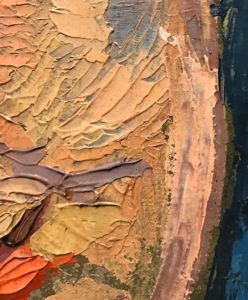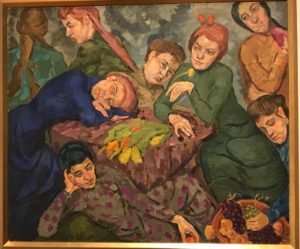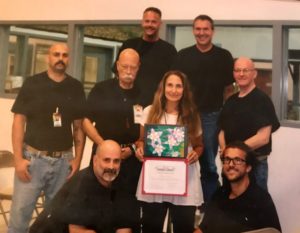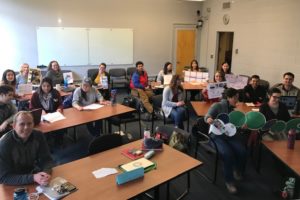Category — Writing
Hidden lives

When you awoke this morning, light streaming in through your bedroom window, what was your first thought?
What does a man, in prison for the past 30 years, think about when he first wakes up, shifting his body on the thin vinyl-coated mattress on the top bunk of his two-man cell?
“When I woke up this morning, I…” was a recent prompt I gave to my Lifers’ Prison Writing group at Oregon State Penitentiary. I’ve been running the group for four years now, beginning each twice-monthly session with a prompt, watching the ten men I have come to know so well bend their heads over lined paper as they write, by hand, their stories. I’ve prompted them with words like trust, power, friendship, dreams, food, fear, hope.
When they write, they exercise the one freedom they have not lost, the freedom of expression. When they write, they process experience; they struggle to make sense of the lives they are living. They look for meaning. They become, for just a short while, writers. Not numbers. Not prisoners. Not convicted murderers. Just men writing.
When they write, make their incarcerated lives visible. I think it is important for us on the outside to know about these lives. With more than 2 million men and women behind bars, with our country claiming the highest rate of incarceration in the world, we need to know, don’t we, where we put these people and what kind of lives they live?
The writing of prisoners allows us into this world. I’ve created a small window into this world with this site, TruthtoPower, where I publish the prompt responses and other short pieces by men in the Lifers’ Writing Group. Longer pieces we’ve worked on together for months, through many revisions and much thought, have made their way to the Pen America Prison Writing Contest, winning two first place awards (2018) (2019), one second place , and one honorable mention these past two years.
I write about the lives lived by those behind bars, the lives of those for whom prison is a permanent home, in my book, A Grip of Time.
I hope you will read their work and mine, not because you know someone in prison, but because you don’t.
August 28, 2019 No Comments
How can you miss me when I won’t go away
 Ha.
Ha.
For maybe the first time since I started this blog (and the one before it), I am NOT writing a post for this Wednesday. So miss me.
Here’s why I am closed for business today:

These are 12 talented, engaged, journalism matters reporters from Europe. And I get to talk with them/ teach them about the craft of nonfiction storytelling. Lucky me.
August 7, 2019 No Comments
Untold stories

Untold stories. There are so many of them.
I started coming into Oregon State Penitentiary almost four years ago with the idea of starting a writers group for men serving life sentences. Behind bars, encircled by 30-foot high concrete walls, the men who joined the writers’ group (like the other 2.3 million men and women currently in U.S. prisons and jails) were living lives few of us knew anything about. I wanted to give them the tools (but more important, the encouragement, the opportunity) to write about those lives. I wanted them to consider the idea that they were the authors of their lives. That meant, even behind bars, even living these severely constricted lives, they had power over the narrative. They did not have physical freedom. But, at least for two and a half hours twice a month, they had freedom of expression.
I’ve written about the group, what the men taught me about their lives and how it changed me, in A Grip of Time: When prison is your life. The men have developed into powerful storytellers. Four of them have won highly competitive Pen America Prison Writing Contest awards (in 2018 and 2019). Several of them have been published by the Marshall Project. One of them became the first inmate ever to be awarded an Oregon Literary Fellowship.
The writers’ group continues. The stories continue. I wanted to create a public space to share some of the small ones. Most are the products of the 10-minute prompts that begin each writers’ group session. So, after many months of planning, yeoman-like volunteer efforts by artist/designer Liza Burns and man-of-many-parts Brian Burk, I am launching TRUTH TO POWER. The site will feature short essays and even shorter stories written by the men in the writers’ group. I hope their words offer a window–many windows–into this hidden world and the people who live there. Sometimes for their entire lives.
June 26, 2019 No Comments
To write. To read. In prison.

The white board at last week’s BookExpo convention was a jumble of post-its, each with the scribbled name of a book, each an answer to the question: What book changed your life? I stood there for a long time reading the titles, delighted at the diversity, the scope, the quirkiness. (The Bible, Handmaid’s Tale, Winnie the Poo, To Kill a Mockingbird)
And I thought about the men at Oregon State Penitentiary in the writing group I’ve been running for going on four years. Behind bars, their access to books, books that could change their lives, is extraordinarily limited.
How limited? Have you read the recent coverage of book banning in prison? More than 120 books — ranging from Adolf Hitler’s Mein Kampf (okay, I get that) to a Pulitzer Prize-winning history of the Attica prison uprisings (and including books on how to make ramen noodles, tattooing, witchcraft) — are on a list of books banned from New Hampshire prisons, according to a prison human rights group.
Outright banning is one way to block access to books in prison. Another is to underfund and undervalue prison libraries. Budgets for buying books can range from nonexistent to skimpy. Yet another is to make it difficult (or impossible) for people to donate books to a prison library.
When I first started coming into OSP to work with Lifers who wanted to write, I had the opportunity to peruse the prison library and saw what was available to them: The shelves were lined with alcohol and drug recovery self-help books, religious tracks, pot-boiler mysteries, Zane Grey-era westerns and not much else.
These men were potential writers of narrative nonfiction. I wanted them to read great narrative nonfiction. I didn’t see any on the shelves. With permission, I started bringing in books from my own home library supplemented by used books from local bookstores.
Three years later, our Lifers Writers “library” (a cabinet made in the prison’s furniture shop) includes work by Alex Kotlowitz and Bryan Stephenson, Joan Didion and Katherine Boo, Anne Lamott, John McPhee, Adrian Nicole LeBlanc, Gay Talese, Jane Kramer, Tom Wicker (yes, the original Attica book), Mary Roach, Tony Horowitz (RIP), James Baldwin, Steve Lopez, William Least Heat Moon—and close to 75 others. They’ve read Evicted, Hillbilly Elegy, The Geography of Bliss, even my coming-of-(middle)-age ballet book, Raising the Barre.
They read. They love to read. Books open the world to them. Reading is helping to make them into the fine writers they are becoming. What book title would they scribble on a post-it? Stay tuned. I’m going to ask them at our next session.
(For me, the book was The Yearling. It was the first book that made me forget who I was and where I was. It transported me. It was the book that made me want to be a writer.)
Why are we reading if not in hope that the writer will magnify and dramatize our days,
will illuminate and inspire us with wisdom, courage,
and the possibility of meaningfulness,
and will press upon our minds the deepest mysteries,
so we may feel again their majesty and power?”
― The Writing Life
June 5, 2019 No Comments
On the road

Don was sitting in the audience at the first event, the launch, for my new book, A Grip of Time. He had been released from prison two months earlier after spending 34 years behind bars. One of the original members of the Lifers’ writing group I had started at Oregon State Penitentiary almost four years ago, he was a part of the book I’d be reading from. I’d asked him before the room filled whether it would be okay if I introduced him at the end of the event. He beamed. Don was beaming a lot these days. He was re-learning how to live, and he could barely contain the joy in that.
When I’d finished reading and answering questions, I introduced Don, and the room erupted with sustained applause. I don’t know why people applauded—and possibly they weren’t quite sure either—but I do know, because Don told me, that it was at that precise moment that he felt part of his new community.
***
At Powell’s in Portland I read about Jimmie’s in-prison marriage. Jimmie was another of my Lifers’ group writers. I read about how at OSP you can get married twice a year, either on a Tuesday in April or a Tuesday in October. You can get married between 8 and 10 in the morning. No flowers. No food. You can’t write your own vows. The ceremony takes 3 minutes, and the go-to Reverend charges 20 bucks a pop. I read about how Jimmie was dressed in his best prison blues and had gotten a haircut the day before.
At the end of the event, after I’d read and answered questions and signed books, an older man who’d been waiting to one side came up to me. “I’m the barber,” he said. For a moment I didn’t understand. “I’m the one who cut Jimmie’s hair,” he said. Then we shook hands and he told me that he’d been out 8 years after being down for 28. He was still cutting hair.
***
The first person to raise her hand after one of the Seattle reading events was a well-worn fortyish woman with a smoker’s gravelly voice. She introduced herself by reciting her prison number, then went on to talk about her 19 revolving-door years behind bars, the GED she finally earned, how education was transforming her life. The other day, she told us in her raspy voice, someone from her old life asked her what her prison ID number had been. She quickly recited it. “Huh?” said her former inmate acquaintance. “That’s one digit too long.” That’s when she realized she had recited her University of Washington student ID number instead.
There was not an un-goosebumped arm in the house.
These are the joys of being on the road for this book
May 22, 2019 9 Comments
Stories change lives

“You are a failure, Harvey, you and the whole science of penology…because you rob prisoners of the most important thing in their lives: their individuality.”
That’s Burt Lancaster in his role as Bob Stroud in the 1962 film, Birdman of Alcatraz.
The real Bob Stroud was still alive when the film was released. He died the very next year, his 54th behind bars.
The movie is almost 60 years old. But the dialog could have been written last week. I wish that were a complement for the timelessness of great writing.
It isn’t.
It is an indictment of our penal system, which robs those behind bars of their humanity, their dignity, their individuality.
They deserve it, you say. They did bad things.
Here’s what I would say: Yes, people who do bad things should be punished for their actions. But 95 percent of those we incarcerate get out one day, out into our communities. If prison treats them as sub-human, if prison robs them of dignity, if prison makes them feel less than whole every single day for years, for decades…tell me, what kind of people will they be when they get out?
That’s a rhetorical question. But let me answer it anyway: Angry, distrustful, self-doubting, lacking in empathy, unable/ unwilling to engage in, nurture and sustain authentic relationships. And that’s on a good day. Is it any wonder that within five years of release, more than three-quarters of released prisoners are rearrested.
Bob Stroud, the Birdman (He kept the birds in Leavenworth, not Alcatraz, by the way) transformed himself from killer to not just an international expert on the diseases of canaries but also the kind of man who held wounded birds in the palm of his hand, who fed them with eye droppers…who cared, who found a purpose, who lived a life of meaning. This despite not because of incarceration.
The fact that Hollywood made a movie of his life shows how extraordinary this rehabilitation was. But rehabilitation should be ordinary. It should be the main purpose of prison.
The writing group I started for Lifers at Oregon State Penitentiary is all about encouraging and nurturing individuality through the telling of stories. Telling your story is owning your story. Owning your story is recognizing that you are its author, which means you are also able to craft a new narrative. Stories spark change. Stories change lives.
You can read about those lives in my new book, A Grip of Time.
May 15, 2019 No Comments
Paint. Write. See.


My mother and my grandfather were both painters, she in oil, he in watercolor. I grew up surrounded by their art. I watched my mother at her easel. (I was once her unhappy model.) But until a few days ago, standing in front of a painting at the Stradt der Frauen exhibit, I never thought about a particular similarity between the work of a painter and the work of a writer.
I don’t mean the obvious similarities: the canvas/ the page; the paint/ the words. I mean something about the way the work is done, the purposeful nearsightedness and farsightedness of the work.
Let me explain. I was walking through one of the rooms in the exhibit and found myself skirting a small group of people clustered around a painting, The Dreamers, by Helene Funke. She was one of the more than dozen forgotten or overlooked women painters of the early 20th century being rediscovered and celebrated in this exhibition.
Historical aside: “Forgotten” and “rediscovered” are loaded words here. She was actually quite well known in French circles before the first World War and established a reputation in Vienna, despite hostile criticism coming from the male-dominated cultural scene. After the 1938 Anschluss (the German/Nazi take-over of Austria), modern art was banished and her work, as well as the work of many others, disappeared. It was not until 2007 that she was rediscovered.
Okay, back to the lower Belvedere and the exhibit. In skirting the group, I found myself just inches away from the canvas. This is not how I look at art. From a nose away, it is all brush stroke and palette knife, thickness and featheriness, color laid on color. It is not art. It is craft. It is the work itself. The detail. You see how the sausage was made. You have to stand back to see the sausage itself.
How like writing, I thought. The nose-away detail of word choice and punctuation, the specific construction of the sentence, where the paragraph breaks. The writer works with her tools, up close, just as the painter does. Then, from a distance, the reader encounters the work and sees the art.
Okay, enough of the High Culture stuff. It’s time to walk to the Spar and hunt for some Spargelcremesuppe. You’d have to have read last week’s blog for that to make sense.
April 3, 2019 2 Comments
Goodbye without leaving*

A year ago, almost to the day, I sent in the manuscript for A Grip of Time: When prison is your life. Some people think that finishing a big project like this is exhilarating, that crafting that last sentence in that final chapter is a celebratory moment. It isn’t. At least not for me. I do not celebrate. I mourn.
Whatever it is I am in the grips of—from this project that hopes to illuminate life behind bars to my other deep dives in hidden subcultures—I am consumed. That world, whatever it is, is my world. I don’t just write about it. I live it, I dream about it. In time I know more about the people I meet, the people who allow me into their world, than I know about most of my friends. I care about them. I care about what they care about. And I never want to leave. I never want to say goodbye. But when I finish a manuscript I do have to say goodbye.
Or do I?
A year ago, almost to the day, I sent in the manuscript for A Grip of Time. But today I will once again drive up to Oregon State Penitentiary to lead the twice-monthly Lifers’ Writers Group, as I have for the past four years. The group, which fueled my in-the-trenches research for the book, is no longer providing material. The book is finished. The book will be out and published May 1. But I have not and cannot say goodbye to the men who write stories that need to be heard, the men I listen to and encourage, the men who crave editing and feedback like no students I have ever had. Whatever I have taught them, they have taught me far more. And so I return.
Last time I was at the prison, I asked the men to write about what writing meant to them. Here is what Jimmie wrote:
For most of my life I felt powerless. When a friend asked me to participate in a writing group, my first thought was, I can’t write. My next thought was, I’ve been incarcerated for thirty years, what the hell did I have to say? Whether I am a good writer or not is debatable. What writing has done for me is empower me. It is something that no one can take away.
And so I return.
*I love Laurie Colwin.
March 20, 2019 2 Comments
Falling in love again


I’ve fallen in love with teaching again.
For this I owe a debt to the smart, creative, focused “stories spark change” graduate students in my University of Washington CommLead storytelling seminar. They are public radio journalists, freelancers, videographers, nonprofit communications specialists, techies, veterans, mothers, fathers. They work all day. Then they spent high-energy Saturdays with me delving into the art and craft of narrative, learning how to tell important stories in compelling ways. And no one nods off. And when five o’clock comes, no one rushes for the door.
And I owe a debt to the forward-thinking, “best and brightest” Austrian journalists I work with, both in Europe and in Seattle, who do not have to be persuaded that journalism matters. They know it does. They live it every day.
But my biggest debt is to the men in my writers group at Oregon State Penitentiary, felons all, murderers most, and some of the best read, most thoughtful, most attentive, most generous, most open to (craving of) constructive critique of any group I’ve ever worked with. Every hour spent with them—and I’ve spent hundreds during the past four years—has been inspiring, enlightening, harrowing (not for my safety but for the stories I hear) and bone-deep satisfying.
There was a time, four or five years ago, when my love of teaching (long a complement to my writing life) was at an all-time low. I was unhappily immersed in “academic life” (which, alas, is not synonymous with teaching) as a full-time full professor. I was expending energy fighting for programs I believed in (and generally losing). I was wasting time (and becoming the kind of person I didn’t want to be) battling over turf. I was spending far too much time sitting in meetings where the people who actually held the power pretended that you had a say. I was working with people who pretended to like each other but didn’t.
I should have left before I did. But that regret has now been effectively scoured. I have learned—these new students of mine have taught me—how to love teaching again.
March 6, 2019 5 Comments
The long haul

“I just want to know one thing,” Jimmie said to me a few months back. Jimmie is a stalwart member of the writers’ group I’ve been running for almost four years. He’s one of eight guys, all convicted murderers serving life sentences in a maximum security prison, who meet with me twice a month to write about their incarcerated lives.
Jimmie’s been inside for 38 years. He’ll be 61 in a couple of months. Another of my writers has spent the last 35 years of his life locked up. He’s 66. The oldest in the group just turned 79. The youngest, about to be 40, began serving his life sentence when he was 17.
When I started this group there were just three guys and me, me nervous and sweaty, me never having set foot in a prison before, me imagining every jailhouse movie cliché and wondering when I’d be shived. Or worse.
Now I don’t think of these men as convicts or inmates or felons or murderers. They are writers. Our agreement, early on, was this: I would teach them how to grab hold and make sense of the narrative of their lives. They would teach me what it was like to live those lives, day after day, year after year.
They learned. They learned so well that they began to love writing. They learned so well that a few of them won literary awards. One time, when there was a scheduling snafu, and they had all gathered but I wasn’t there, they assigned themselves a writing prompt, sat and wrote and then shared their work. They learned so well that they hardly needed me.
And I learned too. I learned from the stories they told about trust and hope, about friendship and food, secrets and dreams, control, privacy, acceptance, forgiveness. I learned so much about the hidden world of prisons, about the real lives they were living (not the Hollywood version that had fooled me into thinking I knew) that I too had to write.
And so I wrote A Grip of Time: When Prison is Your life to illuminate this hidden world, to grapple with questions of guilt and shame, punishment, rehabilitation and forgiveness. To show there was humor and humanity in the least likely of places. I had been reading excerpts of the book to them as I wrote. Then one day I told them I had finished the manuscript.
That’s when Jimmie said, “I just want to know one thing.”
It was hard to know when Jimmie was worried. He always looked worried. “Are you going to leave us now?” he asked. “I mean now that the book is done.” His voice was low, but I could hear the catch in it. We all could.
I looked around the table. A few years ago, I could not have imagined being here. Now I could not imagine not being here.
“I’m in it for the long haul,” Jimmie,” I said. And then I gave them another prompt, and they all bent their heads to write..
A version of this essay is at my publisher’s site (with, of course, a link to pre-order). Also at powells and at amazon.
February 6, 2019 No Comments





